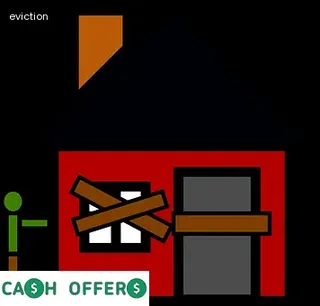Eviction law in Virginia is designed to protect landlords and property managers while also ensuring tenants are provided with ample notice and rights. Landlords must give a tenant at least 14 days' notice before beginning the eviction process.
The eviction process can take anywhere from two weeks to several months depending on the circumstances. If the tenant does not respond after being served with a summons, then a landlord/property manager can proceed with filing an unlawful detainer in court within five days of receiving service.
If the tenant does not contest the case, then a judge will likely enter a judgment for possession in favor of the landlord/property manager. Otherwise, if the tenant contests it, then there will be a trial and depending on both parties’ evidence and arguments, a judge may decide in favor of either side or issue an alternative order such as paying rent arrears.
If a judge rules in favor of the landlord/property manager, they can request that a writ of possession be issued which would require that sheriff's deputies enforce the eviction order by evicting the tenant within 24 hours.

In Virginia, landlords and property owners must have a legal basis for eviction. Eviction can only be granted if the tenant has violated the terms of the lease agreement or has not paid rent.
Before starting the eviction process, it is essential to ensure that appropriate grounds exist in order to avoid any future legal complications. The most common reasons for eviction in Virginia include failing to pay rent on time, violating the terms of the lease agreement, damaging property, disturbing other tenants, or breaking local laws.
Landlords should also be aware that evictions are illegal if they are based on discrimination against protected classes or retaliation against a tenant who exercised their rights. If a landlord believes their tenant is guilty of such actions, they should seek legal advice before initiating an eviction process.
Posting an eviction notice is a crucial step in the eviction process in Virginia. Landlords and property managers must ensure that they follow all the necessary procedures and steps to inform their tenants of the eviction.
The eviction notice must be posted on the tenant's door, mailed, or both. In addition, landlords must provide proof of service in order to move forward with the legal proceedings.
The type of proof required depends on how the notice was served. For example, if served by mail, a return receipt should be provided as evidence.
On the other hand, if served by posting it on the tenant's door, then landlords should try to get a witness to sign an affidavit stating when and where it was posted. It is important that these steps are taken properly so that there are no delays or issues with the eviction process.

Filing a complaint in the appropriate Circuit or District Court is the first step in the eviction process for landlords and property managers in Virginia. This can be done either by filing a Warrant in Debt or by filing an Unlawful Detainer.
The former is suitable for situations where tenants have failed to pay rent, while the latter is used when tenants are violating other lease terms such as unauthorized occupants or damage to the premises. After filing, a summons will be served to the tenant and they will have five days to answer the complaint.
If they do not respond within those five days, then landlords or property managers can file for a Writ of Possession with the court clerk which grants them possession of their property back.
When it comes to the eviction process in Virginia, property managers and landlords must attend the hearing in order to move forward with the eviction. Before attending, both parties should be adequately prepared.
As a landlord or property manager, it is important to ensure that all paperwork is filled out correctly and that all necessary documentation is present at the hearing. If a tenant does not appear for the hearing, then a default judgement may be granted in favor of the landlord or property manager.
At the hearing itself, both parties will present their case before a judge who will make a decision based on state laws and evidence presented by each side. In some cases, tenants are able to remain in their properties if they can provide evidence that they have paid rent or broken lease terms due to extenuating circumstances.
It is important for landlords and property managers to understand what outcomes are possible from an eviction hearing so that they can properly prepare themselves for the process ahead.

The eviction process in Virginia is a complicated and time-consuming endeavor that can be daunting for landlords and property managers. It is important to understand the legal requirements and options associated with removing a tenant from a rental property before beginning the eviction process.
The first step is to provide notice of eviction to the tenant, which must include the reason for evictions and any possible remedies. If the tenant does not comply, then landlords and property managers must file an unlawful detainer lawsuit with the court to begin the eviction process.
Depending on various factors such as jurisdiction, local laws, and if a jury trial has been requested, it can take anywhere from several weeks to several months for the case to be heard by a judge. After the judge has ruled in favor of either landlord or tenant, there are additional procedures that may need to be taken in order to physically remove the tenant from the premises.
Landlords and property managers should familiarize themselves with these legal requirements in order to ensure they have taken all necessary steps in removing their tenants according to Virginia state law.
Illegal evictions in Virginia are a serious issue that can lead to costly penalties and legal action. In the state of Virginia, landlords and property managers must follow specific eviction procedures outlined by the Commonwealth of Virginia in order to legally remove tenants from their properties.
If these laws are not followed, landlords or property managers can face steep fines, court-ordered damages and other legal consequences. It is important to understand the protections afforded to tenants through Virginia law so that landlords and property managers can avoid any potential illegal evictions and protect themselves from liability.
Furthermore, it is important to be aware of the penalties associated with breaking eviction laws so that all parties involved can take steps to ensure they remain compliant with the statutes set forth by the Commonwealth of Virginia.

In Virginia, the eviction process can be a long and complicated one for landlords and property managers. It begins with providing notice to the tenant that they are in violation of the terms of their rental agreement.
The type of notice required depends on the reason for eviction, such as non-payment of rent or lease violation. Once given, the tenant has three days to vacate or remedy the issue.
If the issue is not resolved within that time period, then a landlord must file an unlawful detainer lawsuit in court. During this step, both parties are asked to provide evidence or testimony about why or why not an eviction should occur.
After all arguments have been heard, a judge will decide whether or not to grant an eviction order. If it is granted, then a writ of possession will be issued by the court allowing law enforcement officers to remove tenants from the property.
All in all, this entire process typically takes between two and three months.
When issuing Notice for Termination With Cause to a tenant in Virginia, landlords and property managers must take into consideration several factors. First, they should ensure that the notice is properly written according to state laws, which include specific language and requirements.
Second, they should be aware that the length of time tenants have to respond or vacate the property depends on their reason for termination. Third, it is important to note that all tenants must receive proper notification prior to any eviction proceedings being initiated.
Finally, it is essential that landlords and property managers understand how long the eviction process takes in Virginia so they can plan accordingly and act within legal parameters. Knowing these guidelines helps both parties prepare for the process correctly and allows them to make informed decisions about their rights and obligations under the law.

In Virginia, if a landlord or property manager is looking to evict a tenant without cause, they are required to give the tenant proper written notice before beginning the eviction process. The notice must specify the date when the tenancy will end and must be delivered at least 30 days prior to that date.
If the tenant fails to vacate by that time, then the landlord or property manager may proceed with filing an unlawful detainer suit in court. It is important to note that while a verbal notice may be legally binding in certain instances, it is typically recommended that landlords and property managers provide written notices for clarity and accuracy when initiating an eviction without cause.
Additionally, landlords and property managers should always consult local laws regarding other potential requirements or restrictions on terminating a tenancy without cause in order to ensure compliance with Virginia law.
In Virginia, tenants have certain rights and defenses against eviction. A tenant may be able to remain in the property if they can prove that the landlord has failed to follow proper procedures.
Tenants must make sure that they are aware of their rights under Virginia law before engaging in any eviction process. For example, landlords must provide written notice prior to filing for an eviction and must serve the tenant with a summons and complaint.
Before evicting a tenant, landlords must also give them the opportunity to cure or fix any violations of the lease agreement. Additionally, tenants may be able to argue that they were not properly served with the eviction summons or that their landlord did not provide them with adequate time to cure any violations of their lease agreement.
It is important for tenants to understand all of their legal rights and defenses against eviction in order to ensure that they are being treated fairly by their landlord.

The eviction process in Virginia can vary widely in duration depending on the nature of the case and the court. In general, the eviction process starts when a landlord or property manager files an Unlawful Detainer suit against the tenant with a local Circuit Court.
The tenant is then served with a summons and complaint, which notifies them of the lawsuit and gives them notice of their right to respond. From there, both parties will have multiple opportunities to present evidence and argue their cases.
Ultimately, however, it is up to the judge to determine how long it takes for an eviction order to be issued. Depending on how busy the court is, this could take anywhere from a few days to several weeks or even months.
It's important for landlords and property managers to understand that they should expect delays throughout this process and plan accordingly in order to protect their rights as well as those of their tenants.
When it comes to understanding the eviction process in Virginia, it can be helpful to compare the state's laws and regulations to those of other states. While each state has its own set of rules and timelines for eviction cases, some tend to have more similarities than differences.
For instance, many states require landlords or property managers to provide a certain amount of notice before filing an eviction case with the court. Additionally, all states have a legal process that must be followed before a tenant can be evicted.
Knowing how Virginia's eviction process compares to those of other states can help landlords and property managers protect their rights during the eviction process. It is important to note that while comparing the processes across different states is beneficial, any specific questions involving Virginia's laws should be discussed with an experienced attorney familiar with local laws and regulations.

In Virginia, landlords and property managers have access to multiple resources during the eviction process. The most important resource is an attorney who specializes in landlord-tenant law and can provide guidance on the various aspects of eviction proceedings.
Additionally, landlords can consult with their local court system for information about filing an eviction notice and other legal requirements. Professional organizations such as National Landlords Association also offer educational materials, as well as contact information for legal services providers in the state.
Additionally, certain counties may have additional resources that are available to landlords during an eviction, such as mediation services or free legal aid clinics. By utilizing these resources, landlords and property managers can better understand the length of the eviction process in Virginia, as well as their rights and responsibilities under the law.
When faced with the need to evict a tenant, landlords and property managers in Virginia may worry about the financial impact this could have on their business. It is important to understand that although the eviction process can be lengthy, there are strategies that can be employed to help minimize any negative financial consequences.
One of the key steps is to ensure that all paperwork related to the tenant’s lease agreement is up-to-date and properly filled out. This includes collecting deposits, payments, and other relevant information.
Additionally, it is important to follow all applicable laws throughout the entire process so as not to incur additional financial costs due to any legal violations. Additionally, landlords should look into alternative solutions such as settlement agreements or mediation before initiating the eviction process if possible.
Although this may result in a short-term loss of income, it can often be more cost-effective in the long run than going through a full eviction procedure. Lastly, landlords should make sure they are familiar with all fees associated with filing an eviction in Virginia so they are able to accurately budget for any necessary legal costs during this time.

Landlords and property managers in Virginia should be aware of the steps to take during an eviction process in order to ensure compliance with local regulations. It is important to understand the law, including any notices that must be given to tenants before proceeding with the eviction.
Additionally, landlords must use an approved method of service when delivering documents to tenants. Landlords should also document all communication with tenants throughout the eviction process and keep records of all payments made by the tenant.
Additionally, when it comes time for a court hearing relating to an eviction, landlords must provide evidence to support their claims as well as copies of documents such as leases or rental agreements. Following these tips will help ensure that the eviction process is carried out correctly and in accordance with local regulations.
In Virginia, landlords and property managers must be aware of their legal obligations to tenants when it comes to the eviction process. One important alternative to an unlawful lockout is for landlords to provide resources and support to tenants throughout the entire process.
This includes informing them of the steps taken once an eviction notice is issued, providing them with access to legal advice, a list of social services in their area, or other financial assistance that may be available. Additionally, they should be aware that they are prohibited from increasing rent or terminating a tenancy agreement without court order.
It is also essential to remember that if a tenant does not follow through on the terms stated in their lease agreement or pay rent by its due date, then landlords have the right to pursue an eviction action. Ultimately, both landlord and tenants should familiarize themselves with Virginia's eviction laws in order to ensure that all parties are operating within the law.
In Virginia, a landlord or property manager has the right to evict a tenant without going to court. The eviction process can take anywhere from two weeks to several months, depending on the circumstances and the laws in each city or county.
The eviction process begins when the landlord serves a written notice of eviction. This notice must be served either personally or by certified mail with return receipt requested.
If the tenant does not comply with the notice within the allotted time frame, then the landlord can file an Unlawful Detainer suit with their local court. In some jurisdictions, it's possible to bypass this step and go directly to court for an expedited hearing.
Once the court renders its decision, a sheriff or marshal may be called in to physically remove any tenants who have not vacated voluntarily.

Delaying an eviction in Virginia is possible, though it should be done with caution. If a landlord or property manager wishes to delay the eviction process, they must first be aware of the legal timeline for an eviction case in Virginia.
According to state law, the tenant has 21 days from the date of service to respond to the summons and complaint. If they fail to file an answer within that time frame, the landlord can apply for a default judgment.
However, if the tenant does file an answer within that timeframe, then a hearing is set for a later date and both parties will have the opportunity to present evidence at this hearing. The amount of time it takes for this hearing date to be determined varies depending on court backlogs and other factors.
It is also important to note that even if a landlord or property manager obtains a judgment in their favor, they still cannot evict immediately. Virginia law requires all evictions be carried out by local Sheriff Deputies and there are certain procedures they must follow before they can remove tenants from a premises.
Therefore, delaying an eviction in Virginia may not be as simple as some property managers may think and could end up taking longer than anticipated.
In Virginia, a tenant has twenty days to move from a property after the landlord successfully obtains a Writ of Possession. This document, granted by the court, is issued after all stages of the eviction process have been completed and gives landlords the legal authority to remove tenants from their property.
The Writ of Possession typically takes about three weeks to obtain in Virginia, depending on the court's schedule. Landlords and Property Managers who are unsure can always contact their county court or attorney for specific information regarding timelines and procedures.
It is important to understand that any time after receiving a Writ of Possession, the tenant must vacate the premises within twenty days or face further legal action.
Eviction records can stay on your record in Virginia for a long time.
Even after a tenant is evicted, it could remain on their record for up to ten years, depending on the circumstances of the eviction and county court decisions.
Landlords and property managers should be aware that having an eviction on their record can have negative implications when it comes to future rental opportunities.
To help landlords and property managers understand more about the eviction process in Virginia, including how long evictions remain on your record, this guide will provide important information.
A: In Virginia, the eviction process may take anywhere from 21 days to several months depending on the circumstances.
A: The length of time it takes to complete an eviction process in Virginia with the help of an attorney varies depending on the complexity of the case, but typically ranges from 30-90 days.

A: The eviction process in Virginia can take between 10-14 days after the Notice to Vacate or Notice to Quit is served by first class mail to the tenant and filed with the General District Court.
A: Self-help management of property and the eviction process in Virginia should be done with caution to protect your health and safety, as well as the locksmith's. Eviction proceedings vary in length depending on several factors, but generally take between two to three weeks for month-to-month tenants who have received a Notice to Vacate or Notice to Quit. However, if a dwelling tenant is being evicted for illegal activity and the eviction notice is served by first class mail to the tenant and filed with the General District Court, it can take up to one month.
A: After a lease has been breached, the landlord must serve a written notice to quit or vacate on the tenant. The tenant then has 14 days to leave the premises. If the tenant does not vacate within this time, the landlord may file a complaint with their local General District Court and request a hearing before a judge. A constable will then serve notice of eviction on the tenant and if the court rules in favor of the landlord, they are legally entitled to evict the tenant. The entire process typically takes 4-6 weeks, depending on any appeals that may be made by the tenant.
A: The amount of time it takes to complete an eviction process in Virginia varies depending on the circumstances. Generally, after a Summons for Unlawful Detainer is issued by the General District Court, the tenant has five days to respond. If the tenant does not respond or appear in court, then a judgment will be entered against them and the landlord can seek to have the tenant removed from their rental unit.